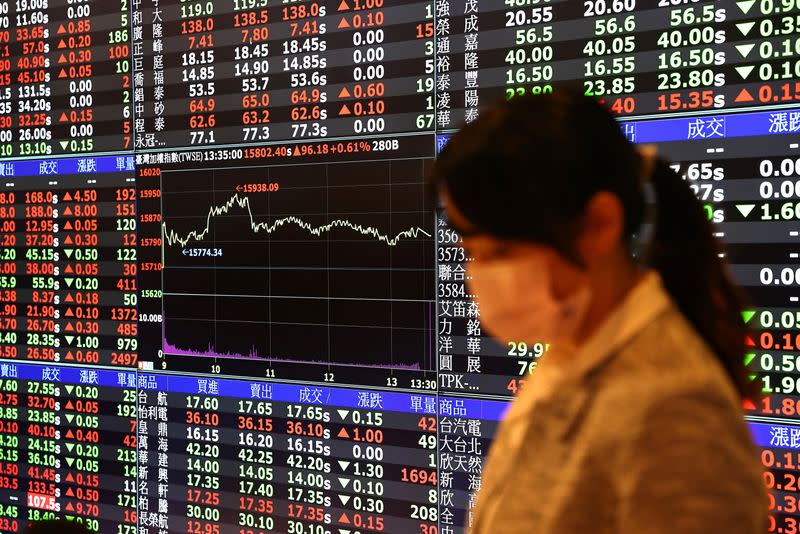Asia’s major stock indexes saw a mixed end to the week as a global tech rally and China’s continuing struggles pulled investors in different directions.
Some shares across the region bounced on Friday, buoyed by a surge for global chipmakers, but Chinese stocks slipped again after bouncing off five-year lows a day before on signs of state support.
Chip-industry stocks led the rally in Japan’s Nikkei share average, lifting the benchmark index to a weekly gain. The Nikkei advanced 1.40% to close at 35,963.27. For the week, it rose 1.09%, despite starting trade with a small loss.
Also on AF: High-Tech Asian Crime Wave: Cyber Scams, Casinos Loot Billions
The index rose as high as 36,076.23 in the session, closing in on Wednesday’s 34-year peak at 36,239.22, but was unable to stay above the key 36,000-mark. The broader Topix added 0.72% on the day, and 0.63% for the week.
Chip-related shares were standout performers, tracking overnight gains in US peers after Taiwan Semiconductor Manufacturing (TSMC), the world’s largest contract semiconductor maker, projected 2024 revenue growth of more than 20%.
However, indicators continue to point to the Nikkei’s 7.47% surge so far in 2024, the best among major global indexes, as ‘overheated’ even after declines in the last two days.
One common gauge called the relative strength index, or RSI, stands at about 72.6, above the 70 threshold that signals an overbought market.
China and Hong Kong stocks slipped after rebounding in the previous session, as a lack of convincing stimulus and economic data kept investors away.
Meanwhile, Beijing is likely ramping up efforts to rescue the market after some exchange-traded funds tracking key indexes saw spikes in daily turnovers, suggesting state-backed funds may be lending support.
The blue-chip CSI 300 Index fell 0.15%, while the Shanghai Composite Index lost 0.47%, or 13.50 points, to end at 2,832.28. The Shenzhen Composite Index on China’s second exchange dropped 0.93%, or 15.88 points, to 1,686.58.
Tech giants listed in Hong Kong declined 0.7% while the benchmark Hang Seng Index fell 0.54%, or 83.10 points, to 15,308.69. The Hang Seng China Enterprises Index declined 0.87%.
Elsewhere across the region, in earlier trade, Taipei advanced more than 2%, while Sydney, Seoul, Mumbai, Singapore, Jakarta and Bangkok were also well up.
In Asia, MSCI’s broadest index of Asia-Pacific shares outside Japan rallied 1.0%, but was still down 2.7% for the week as jitters about the global interest rate outlook dominated.
US Dollar Flat
The stock rally was set to spill over to European markets, with Eurostoxx 50 futures up 0.4%. The tech-heavy Nasdaq 100 futures climbed another 0.3%, after hitting a record high overnight.
The yen lost 0.2% to 148.48 per dollar, having fallen almost 2.5% for the week to the lowest level since early December.
Data overnight showed that US weekly jobless claims unexpectedly dropped, adding to signs of the resilience in the economy which tempered some hopes of a March interest rate cut from the Federal Reserve.
Futures were still leaning towards a first rate cut in March from the Fed but with less conviction at a 55% probability, down from 70% last week.
The US dollar index, which measures the greenback against a basket of major currencies, was little changed on the day but has gained 0.9% this week as central bank officials pushed back against the aggressive easing expectations priced in by markets.
Treasuries held mostly steady in Asia but are also set for heavy weekly losses. The 10-year yield rose 2 basis points to 4.1593%, up 21 basis points for the week, while the two-year yield held at 4.3651% and up 23 bps on the week.
Oil prices were on edge amid worries about increasing geopolitical risks in the Middle East. The US launched new strikes against Houthi anti-ship missiles aimed at the Red Sea on Thursday, while Pakistan conducted strikes inside Iran, two days after Iranian strikes inside Pakistani territory.
US crude futures were flat at $74.12 per barrel and Brent futures were at $78.99, down 0.1% on the day.
Key figures
Tokyo – Nikkei 225 > UP 1.40% at 35,963.27 (close)
Hong Kong – Hang Seng Index < DOWN 0.54% at 15,308.69 (close)
Shanghai – Composite < DOWN 0.47% at 2,832.28 (close)
London – FTSE 100 > UP 0.60% at 7,504.21 (0933 GMT)
New York – Dow > UP 0.54% at 37,468.61 (Thursday close)
- Reuters with additional editing by Sean O’Meara
Read more:
Chinese Exporters Face Shipping Crisis From Red Sea Attacks
China’s Property Struggles Deepen as New Home Prices Dive
China’s Population Drops Again, Economic Fallout Fears
Hang Seng Gains on Policy Bets, Nikkei Flat on Overheating Fears























